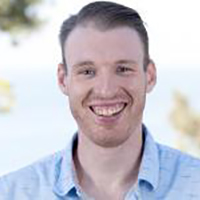
Andrew Parlier
Title: New Instruments to Measure Small-Scale Flows and Mixing in the Ocean
Abstract: Ocean mixing helps modulate thermal balances, ocean-atmosphere interactions, biological variability, and more. Mixing is estimated through measurements or estimates of turbulence; despite several decades of technological development, these measurements are costly and thus sparse. We are developing instruments to address this challenge. Advancements over the last decade in integrated circuit technology have enabled the development of two instruments in particular. The first is an instrument that will measure three-dimensional velocity fields with high temporal and spatial resolution from profiling platforms. Inspired by pioneer analogue instruments developed in the 70’s, 80’s, and 90’s such as the Modular Acoustic Velocity Sensor (MAVS), the Travel Time Velocimeter (TTV) uses piezoelectric transducers to generate and detect high frequency acoustic pulses. This instrument shows an increase in sampling rate and a decrease in cost compared to previous instruments. The second instrument is an APEX Argo float integrated with our “epsi” microstructure package. This extremely low-power package includes a shear probe, a high-response thermistor, and accelerometers from whose data we calculate turbulent dissipation rate (ϵ) and thermal dissipation rate (χ). Processing is done on board the instrument, which allows for telemetry of mixing data over the Iridium satellite network. These two instruments will allow for higher temporal and spatial resolution measurements of mixing across the globe as well as inexpensive and highly customizable measurements.
Bio: Andrew Parlier is a PhD student advised by Matthew Alford in the Multiscale Ocean Dynamics (MOD) group at Scripps Institution of Oceanography (SIO), UC San Diego. He received his Bachelor’s and Master’s degrees in Mechanical Engineering from Stanford University with concentrations in mechatronics and thermal systems. He spent several years working in the biomedical, consumer, and sustainable technology industries in the Bay Area before joining MOD. He develops instrumentation to better measure small-scale oceanographic phenomena and is driven by removing humans from the process of ocean data collection. He is a recipient of an National Defense Science and Engineering Graduate (NDSEG) fellowship from the Office of Naval Research (ONR). Contact: cparlier@ucsd.edu




